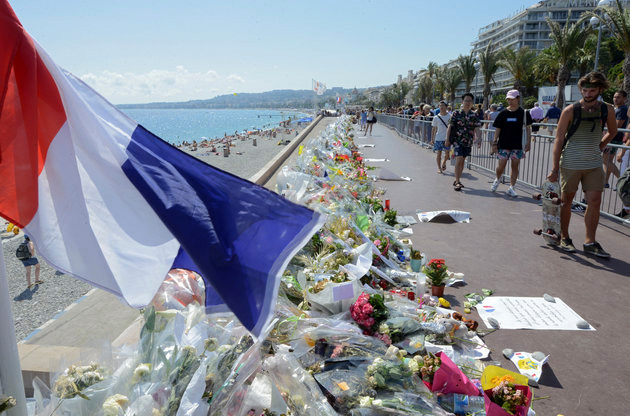 |
| 26 July 2016: The Promenade des Anglais in Nice, France is still lined with flowers to mourn the 84 people killed in the Bastille Day attack. (Jean-Pierre Amet, Reuters) |
The Banality of Terror
Citizens of France, Belgium, Germany, the United States, Turkey, Iraq, Bangladesh and elsewhere will take no comfort in the knowledge that terrorist attacks are now a fact of life. One can easily imagine scenes of immediate carnage as battlefields, with the fallen considered as casualties of war.
An all-out war is going on in Iraq, as the Iraqi army, Kurdish Peshmerga, Shiite militia and American air support gradually reclaim territory from the so-called Islamic State, or ISIL. As ISIL loses ground (notably Fallujah, with Mosul being the next city to be liberated), it escalates its asymmetric warfare against Baghdad, setting off one car bomb after another at its mosques and markets.
France, like the U.S., is also a participant of air strikes targeting ISIL in Iraq and Syria. Yet politicians and media pundits should take care before resorting to the common rhetoric that France is “at war,” which admittedly is true in the most technical sense.
Terrorist attacks are nothing new in this space. I have been writing about them since September 11, 2001.
One thing that has changed since then is the ever greater mutation amongst the terrorists. In addition to cells of known terrorist organizations, or radicals with their manifestos of intolerance, we now have “lone wolves” who draw no attention to themselves until they seemingly commit mass murder at will. We now worry not just about a bomb smuggled aboard a plane, or a suicide vest worn by a hostage-turned-operative, but also a knife, gun or truck easily available to a deranged young man.
Only with a case-by-case investigation can we know whether these lone wolves are actually indoctrinated by the likes of ISIL, and driven to act because of it. These days, having a north African heritage and making one utterance of "allahu akbar" on social media will count as such, to the delight of the terrorist groups who are all too happy to claim another martyr for their propaganda efforts. This leads to the oversimplified view of a war being waged between a state's security apparatus and a nefarious criminal organization, and the feel-good yet unrealistic narrative that the former will always prevail, because it must. As I said before, real-world events do not follow the script of a James Bond movie.
For these disaffected individuals seeking that brief, devastating moment of empowerment, jihad is no longer the motivation for their crime, but merely its lame excuse. Their single attack is a solipsistic act, eluding justice in death.
Sometimes a homicidal madman is just that, nothing more. He is indeed dangerous. However, no matter how many people he is able to kill, he will in no way pose an existential threat to a democratic society such as the one in France, so long as its basic institutions remain viable and secure.
(P.S., Yes, Nice was very nice. This visitor expresses his deepest condolences.)
-- CW, 15-17 July 2016
| Back to top |
